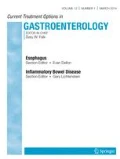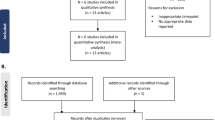Opinion statement
Infliximab is arguably the first major advance in therapy for inflammatory bowel disease in more than a quarter of a century. Although it is important to distinguish efficacy from effectiveness, the data from clinical practice mirror those from randomized controlled trials. Infliximab has proven efficacious for luminal manifestations of Crohn’s disease (CD) regardless of location. It also has proven efficacy in the subset of penetrating disease to the skin and perianal area, and it increases rates of steroid-free remission. These benefits are reflected in improved quality of life, with limited data showing that infliximab can decrease rates of hospitalization and CD-related surgery. Infliximab also has proven to be efficacious in patients with ulcerative colitis (UC) and has increased rates of steroid-free remission. Whether infliximab will have an impact on the risk of colorectal cancer in UC and Crohn’s colitis has yet to be determined. The combination of strong evidence from large randomized controlled trials with substantial examination of use in the practice setting has moved biologic therapy with infliximab from novel to mainstream. In this review, the data for the efficacy of infliximab in controlled trials will be discussed in the context of real world effectiveness.
Similar content being viewed by others
References and Recommended Reading
Bamias G, Nyce MR, De La Rue SA, et al.: New concepts in the pathophysiology of inflammatory bowel disease. Ann Intern Med 2005, 143:895–904.
Farrell RJ, Shah SA, Lodhavia PJ, et al.: Clinical experience with infliximab therapy in 100 patients with Crohn’s disease. Am J Gastroenterol 2000, 95:3490–3497.
Cohen RD: Efficacy and safety of repeated infliximab infusions for Crohn’s disease: 1-year clinical experience. Inflamm Bowel Dis 2001, 7(Suppl 1):S17–S22.
Ricart E, Panaccione R, Loftus EV, et al.: Infliximab for Crohn’s disease in clinical practice at the Mayo Clinic: the first 100 patients. Am J Gastroenterol 2001, 96:722–729.
Lichtenstein G, Cohen RD, Feagan BG, et al.: Safety of infliximab in Crohn’s disease: data from the 5000 — patient TREAT registry [abstract]. Gastroenterology 2004, 126:A54.
Gasche C, Scholmerich J, Brynskov J, et al.: A simple classification of Crohn’s disease: report of the Working Party for the World Congresses of Gastroenterology, Vienna 1998. Inflamm Bowel Dis 2000, 6:8–15.
ten Hove T, van Montfrans C, Peppelenbosch MP, van Deventer SJ: Infliximab treatment induces apoptosis of lamina propria T lymphocytes in Crohn’s disease. Gut 2002, 50:206–211.
Van den Brande JM, Braat H, van den Brink GR, et al.: Infliximab but not etanercept induces apoptosis in lamina propria T-lymphocytes from patients with Crohn’s disease. Gastroenterology 2003, 124:1774–1785.
Zimmermann-Nielsen E, Agnholt J, Thorlacius-Ussing O, et al.: Complement activation in plasma before and after infliximab treatment in Crohn disease. Scand J Gastroenterol 2003, 38:1050–1054.
Akobeng AK, Zachos M: Tumor necrosis factor-alpha antibody for induction of remission in Crohn’s disease. Cochrane Database Syst Rev 2004, 1:CD003574.
Lichtenstein GR, Yan S, Bala M, et al.: Remission in patients with Crohn’s disease is associated with improvement in employment and quality of life and a decrease in hospitalizations and surgeries. Am J Gastroenterol 2004, 99:91–96.
Lichtenstein GR, Abreu MT, Cohen R, et al.: American Gastroenterological Association Institute technical review on corticosteroids, immunomodulators, and infliximab in inflammatory bowel disease. Gastroenterology 2006, 130:940–987.
Targan SR, Hanauer SB, van Deventer SJ, et al.: A short-term study of chimeric monoclonal antibody cA2 to tumor necrosis factor alpha for Crohn’s disease. Crohn’s Disease cA2 Study Group. N Engl J Med 1997, 337:1029–1035.
Ljung T, Karlen P, Schmidt D, et al.: Infliximab in inflammatory bowel disease: clinical outcome in a population based cohort from Stockholm County. Gut 2004, 53:849–853.
Hanauer SB, Feagan BG, Lichtenstein GR, et al.: Maintenance infliximab for Crohn’s disease: the ACCENT I randomised trial. Lancet 2002, 359:1541–1549.
Baert F, Noman M, Vermeire S, et al.: Influence of immuno-genicity on the long-term efficacy of infliximab in Crohn’s disease. N Engl J Med 2003, 348:601–608.
Mahadevan U, Kane S, Sandborn WJ, et al.: Intentional infliximab use during pregnancy for induction or maintenance of remission in Crohn’s disease. Aliment Pharmacol Ther 2005, 21:733–738.
Vasiliauskas EA, Church JA, Silverman N, et al.: Case report: evidence for transplacental transfer of maternally administered infliximab to the newborn. Clin Gastroenterol Hepatol 2006, 4:1255–1258.
Centers for Disease Control and Prevention. The immuno-compromised traveler. Travelers’ Health: Yellow Book [serial online]. http://www2.ncid.cdc.gov/travel/yb/utils/ybGet.asp?section=special&obj=hivtrav.htm. Accessed February 27, 2007.
Rutgeerts P, D’Haens G, Targan S, et al.: Efficacy and safety of retreatment with anti-tumor necrosis factor antibody (infliximab) to maintain remission in Crohn’s disease. Gastroenterology 1999, 117:761–769.
Rutgeerts P, Feagan BG, Lichtenstein GR, et al.: Comparison of scheduled and episodic treatment strategies of infliximab in Crohn’s disease. Gastroenterology 2004, 126:402–413.
Biancone L, Orlando A, Kohn A, et al.: Infliximab and newly diagnosed neoplasia in Crohn’s disease: a multicentre matched pair study. Gut 2006, 55:228–233.
Thayu M, Markowitz JE, Mamula P, et al.: Hepatosplenic T-cell lymphoma in an adolescent patient after immuno-modulator and biologic therapy for Crohn disease. J Pediatr Gastroenterol Nutr 2005, 40:220–222.
Lichtenstein GR, Feagan BG, Cohen RD, et al.: Serious infections and mortality in association with therapies for Crohn’s disease: TREAT registry. Clin Gastroenterol Hepatol 2006, 4:621–630.
Farrell RJ, Alsahli M, Jeen YT, et al.: Intravenous hydrocortisone premedication reduces antibodies to infliximab in Crohn’s disease: a randomized controlled trial. Gastroenterology 2003, 124:917–924.
Hommes D, Baert F, van Assche C, et al.: Management of recent onset Crohn’s disease — a controlled randomized trial comparing step-up and top-down therapy [abstract]. Gastroenterology 2005, 129:371.
Rubenstein JH, Chong RY, Cohen RD: Infliximab decreases resource use among patients with Crohn’s disease. J Clin Gastroenterol 2002, 35:151–156.
Sands BE, Anderson FH, Bernstein CN, et al.: Infliximab maintenance therapy for fistulizing Crohn’s disease. N Engl J Med 2004, 350:876–885.
Levy C, Tremaine WJ: Management of internal fistulas in Crohn’s disease. Inflamm Bowel Dis 2002, 8:106–111.
Arseneau KO, Cohn SM, Cominelli F, et al.: Cost-utility of initial medical management for Crohn’s disease perianal fistulae. Gastroenterology 2001, 120:1640–1656.
Lawson MM, Thomas AG, Akobeng AK: Tumour necrosis factor alpha blocking agents for induction of remission in ulcerative colitis. Cochrane Database Syst Rev 2006, 3:CD005112.
Rutgeerts P, Sandborn WJ, Feagan BG, et al.: Infliximab for induction and maintenance therapy for ulcerative colitis. N Engl J Med 2005, 353:2462–2476.
Jarnerot G, Hertervig E, Friis-Liby I, et al.: Infliximab as rescue therapy in severe to moderately severe ulcerative colitis: a randomized, placebo-controlled study. Gastroenterology 2005, 128:1805–1811.
Author information
Authors and Affiliations
Corresponding author
Rights and permissions
About this article
Cite this article
Behm, B.W., Bickston, S.J. Efficacy of infliximab for luminal and fistulizing Crohn’s disease and in ulcerative colitis. Curr Treat Options Gastro 10, 171–177 (2007). https://doi.org/10.1007/s11938-007-0010-6
Published:
Issue Date:
DOI: https://doi.org/10.1007/s11938-007-0010-6




